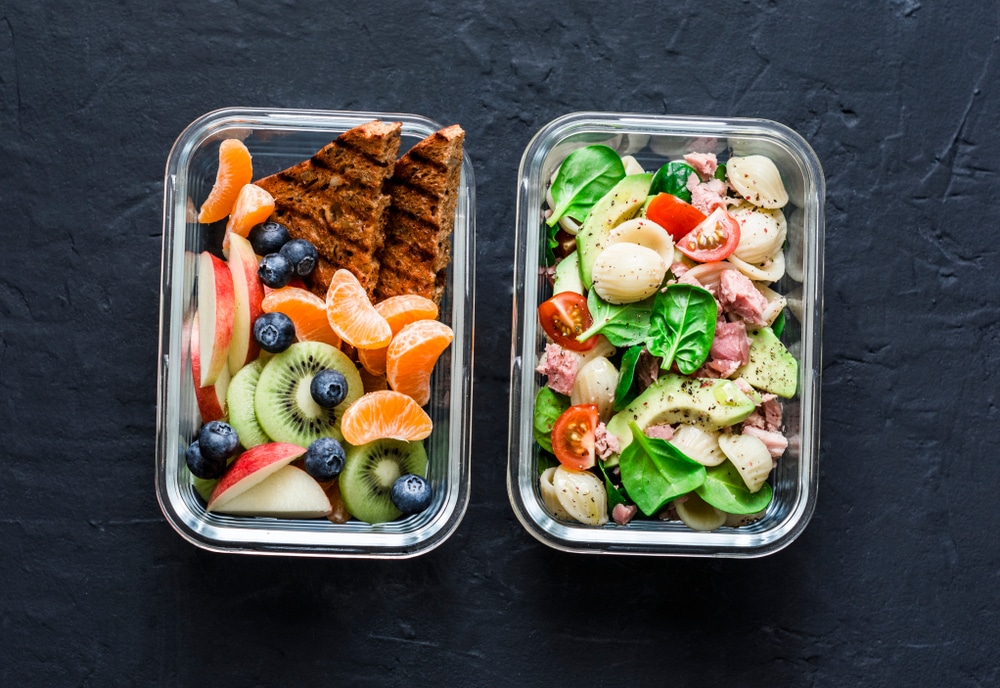You might have heard about the Mediterranean Diet. It’s a diet that focuses on whole grains, fruits, vegetables, legumes, and fish. These types of foods are high in fiber and low in saturated fat. The Mediterranean diet is one of the best ways to lose weight and keep it off, or maintain a healthy weight. It has been shown to reduce the risk for heart disease and stroke, as well as certain cancers such as breast cancer in women who have gone through menopause. In this article, we’ll show you how to start the Mediterranean Diet. We’ll tell you what types of foods make up this diet, and we’ll show you a sample menu plan for one day. Let’s get started!
Get your personalized
meal plan!
What Is The Mediterranean Diet?
The “Mediterranean” in the Mediterranean Diet doesn’t refer to a specific place or country – it’s the name of the climate and culture in the region surrounding the Mediterranean Sea. People who live in this part of the world eat meals that are high in fruits, vegetables, nuts, legumes (such as beans), grains, seeds, and olive oil – foods that are all very healthy for you.
To simplify one’s understanding of this diet, Oldways Preservation & Exchange Trust created the Mediterranean Diet Pyramid. At the base of this pyramid are “core foods” that everyone should eat every day. These core foods include whole grains, fruits, vegetables, beans, herbs, spices, nuts, and healthy fats such as olive oil (9).
Next are “supplemental foods.” You’ll eat these types of food twice a week at most – they include fish and seafood that come from sustainable sources. You can also have small portions of dairy products – including eggs – poultry and red meat occasionally (9).
Finally at the top of the pyramid are your least-healthy choices: sweets and refined grains (such as white bread or pasta). You should avoid eating too many of these types to maintain a heart-healthy diet (9).
Read More: Mediterranean Diet 30-Day Meal Plan 1500 Calories: Lose Weight With Delicious Foods
How To Implement The Mediterranean Food Pyramid
Since many people already know they should fill their plates with vegetables and fruits, this is where you’ll start – at the bottom of the pyramid. Everyone needs to eat more fresh produce, including vegetables and fruits. However, implementing this diet requires you to understand each food group, so we’ll take a closer look below.
Core Foods
Core foods are considered to be fundamental parts of your diet – so fundamental that everyone should include them in their diets every day. These items are listed in order starting from the bottom of the pyramid.
Whole Grains
A source of complex carbohydrates, these foods are a good source of fiber and B vitamins – including folate (14). You can choose from whole wheat bread, oatmeal, brown rice, quinoa and more.
Vegetables
Since vegetables contain phytochemicals that may help keep cells healthy, you should eat at least three servings each day. Include dark leafy greens like spinach or kale in your diet regularly. These items are rich sources of beta-carotene – an antioxidant that helps fight cell damage to your body’s cells (4).
Fruits
Fruits also contain lots of essential vitamins and phytochemicals, plus fiber and water to promote digestion. One serving equals one medium fruit (about the size of your fist). Aim to eat a few servings each day so you’ll meet your daily fruit intake.
Legumes
This group includes beans, peas, lentils, nuts and soy products like tofu. They are rich in protein as well as soluble fiber which can help lower your total blood cholesterol levels (13).
Olive Oil
A heart-healthy type of fat, olive oil contains monounsaturated fatty acids (MUFAs). These fats may help reduce bad LDL cholesterol while raising good HDL cholesterol levels in your body (10).
Herbs & Spices
Herbs and spices enhance the flavor of your food without adding fat or calories. Choose items like thyme, rosemary, basil and oregano instead of salt to season your food with.
Nuts
A source of healthy fats that contain antioxidants to fight off free radicals in your body, nuts can improve blood vessels’ ability to dilate and relax. They also have a high amount of fiber – which helps lower blood pressure and protect your heart (6).
According to the “core foods” list, you should eat a quarter cup of nuts or seeds each day.
BetterMe app will kick you out of the mental funk, shake off your extra weight, rid you off your energy-zapping habits, and help you sculpt the body of your dreams. Intrigued? Hurry up and change your life for the better!
Supplemental Foods
Include these in your diet about twice a week – whether you’re eating fish from the Mediterranean Sea or North American waters.
Fish From Sustainable Sources
This refers to seafood harvested from largely sustainable fisheries that can replenish themselves through natural reproduction. These types of fish include cod, wild salmon and pollock. When it comes to canned tuna, skipjack and yellowfin are better options because they have lower mercury levels than albacore tuna.
Seafood & Shellfish
This food group includes oysters, squid and shrimp that are high in protein and low in mercury – providing you with a good source of high-quality protein.
Moderate Intake Foods
Eat foods from this list two to four times per week, depending on their fat and calorie content.
Dairy
Consume a serving of this food group twice a day, which can include a half cup of low-fat or skim milk or yogurt, one ounce of cheese or a serving of calcium-fortified soymilk.
Cheeses
Choose low-fat dairy products, these are rich sources of calcium – which is essential for keeping your blood pressure under control as well as supporting healthy bones (1). Whole milk cheeses should be limited to one ounce per serving since they’re higher in saturated fat content. Low-fat versions include cottage cheese, ricotta cheese and reduced fat Swiss cheese.
Poultry
This food group includes chicken as well as other birds such as duck and squab, which can be prepared with the skin removed. When it comes to poultry, aim for two servings each week – one of which should be dark meat since it’s a source of protein and iron.
Eggs
A source of high quality protein, eggs can provide you with vitamin B12 and selenium – an antioxidant that helps prevent damage to cells (12). Avoid fried eggs and scramble or boil them instead of frying them in oil or butter. Aim for two or three servings each week (but no more than seven).
Infrequent Intake Foods
Consume these foods once weekly at the most. If you can go without eating these, it’s advisable to do so.
Red Meat
These include beef and pork chops as well as lamb. Even if you’re going for leaner cuts of meat – such as bison, buffalo, or venison – still limit yourself to one serving per week. This is because red meat contains higher levels of saturated fat- which can raise your blood cholesterol level and cause plaque buildup in your arteries (11).
Sweets & Other Carbohydrates
Although you should limit the number of servings you have, some desserts are okay to enjoy if they’re made with whole grains, sweeteners like honey or fruit juice, instead of white sugar. Limit yourself to two servings from this category each week. Choose from items like candy bars, cookies, and cake. However, always remember portion control!
Hot Dogs & Sausage
These types of meat are usually made from red meats or poultry and can be high in sodium or contain additive chemicals such as nitrates/nitrites (2). They are best avoided or limited to an occasional treat.
Fried Or Fast Foods
These foods are usually high in calories and fat from cooking oils, as well as sodium from processed ingredients (2). They should also be enjoyed very occasionally.
Read More: 28-Day Mediterranean Diet Plan: Should You Give It A Try Or Not?
Health Benefits Of The Mediterranean Diet
There are several reasons why this eating pattern is beneficial. Some of the research-backed benefits are:
Weight Loss
People who follow a Mediterranean-style diet – which calls for a healthy diet and increased physical activity – have been shown to have weight loss success. Several studies have found that individuals on this type of diet lost weight or were less likely to be overweight or obese (5).
Cancer Prevention
A healthy diet such as the Mediterranean diet, which is high in plant foods and unsaturated fats and low in red meats and other animal proteins, can help reduce your risk of developing certain types of cancer (5).
Heart Disease Prevention
This diet has been shown to reduce the risk of heart disease and stroke by improving blood cholesterol, decreasing blood pressure and reducing inflammation. It has also been associated with a reduced prevalence of metabolic syndrome – a combination of conditions that increases the risk for type 2 diabetes, coronary heart disease and stroke (8).
Improved Brain Function
Studies show that this way of eating may help decrease your risk of developing Alzheimer’s disease and other types of dementia. It has also been associated with improved cognitive function and brain plasticity (5).
Gut Health
A healthy diet like the Mediterranean diet can support gut health because it limits foods that contribute to gastrointestinal inflammation and oxidative stress (a process that damages cells and depletes body antioxidants) (5).
This diet is also high in fruits, vegetables and whole grains, which contain prebiotic fiber – the food for your gut microbiome. Studies show that people who regularly eat these foods have healthier gut microbiomes than those who don’t (5).
Lean and toned-up body isn’t just a far-fetched fantasy. Check out the BetterMe app and watch it propel your weight loss journey into high gear!
Tips & Tricks For Making This Diet Work For You
While the Mediterranean-style diet might seem fairly straightforward, here are a few tips to make sure you get all of the nutrients you need:
Make Sure You’re Getting Enough Nutrients
Consuming whole grains as part of your meal – such as brown rice or quinoa – as well as vegetables and fruits will help ensure you’re meeting your daily nutrient needs.
Control Your Portions
Although the pyramid specifies what you should eat, it doesn’t give specific portions – so serve yourself smaller amounts if you are trying to lose weight. Portion control is important to help you stay at or below your daily calorie needs.
Include Herbs & Spices
Increase the antioxidant power of a meal with herbs and spices, which also add great flavor (3). Try adding fresh parsley to a meal for a burst of green color and taste! You can also use herbs and spices in place of salt.
Be Mindful Of Alcohol Intake
If you choose to drink, limit yourself to one glass per day (preferably red wine) as alcohol is high in calories and added sugars.
Choose Healthy Fats
To keep it heart-healthy, be sure to choose olive oil over other cooking oils such as corn oil, safflower oil or sunflower oil – but go easy on the amount you use.
Make Time For Cooking
It doesn’t have to be complicated – but the more you cook, the greater control you’ll have over what’s going into your meals. Plus there are plenty of simple recipes available online that taste great and don’t take long to make.
Exercise More
The Mediterranean diet is about more than what you eat. It also emphasizes being physically active. Set aside time to move more throughout the day – park far away from where you work or take the stairs instead of an elevator whenever possible.
Sleep Better
Another aspect of healthy living that can’t be ignored is getting enough sleep. Aim for seven to nine hours of shut-eye each night – research shows that people who don’t get enough sleep are more likely to have a heart attack or stroke over the course of several years (7).
The Bottom Line
This eating plan focuses on whole grains and fresh fruits and vegetables instead of processed foods high in sugar or saturated fat. The more closely you follow these guidelines, the more likely you’ll reap all the health benefits associated with the Mediterranean-style diet approach. Get started by using our Mediterranean Diet Pyramid – it’s designed to help you build a healthy plate to start enjoying this way of eating.
DISCLAIMER:
This article is intended for general informational purposes only and does not address individual circumstances. It is not a substitute for professional advice or help and should not be relied on to make decisions of any kind. Any action you take upon the information presented in this article is strictly at your own risk and responsibility!
SOURCES:
- Calcium Intake and Health (2019, nih.gov)
- Extensive use of monosodium glutamate: A threat to public health (2018, nih.gov)
- Health Benefits of Culinary Herbs and Spices (2019, nih.gov)
- Health Benefits of Fruits and Vegetables (2012, nih.gov)
- Health Benefits of Mediterranean Diet (2019, nih.gov)
- Health Benefits of Nut Consumption (2010, nih.gov)
- How Sleep Deprivation Affects Your Heart (2020, sleepfoundation.org)
- Impact of a Mediterranean Dietary Pattern and Its Components on Cardiovascular Risk Factors, Glucose Control, and Body Weight in People with Type-2 Diabetes: A Real Life Study (2018, pubmed.gov)
- Mediterranean Diet Pyramid: A Proposal for Italian People. A Systematic Review of Prospective Studies to Derive Serving Sizes (2019, mdpi.com)
- MUFAs (2015, oup.com)
- Red and Processed Meat and Health Risks: How Strong Is The Evidence (2020, diabetesjournal.com)
- The nutritional properties and health benefits of eggs (2010, emerald.com)
- The potential health benefits of legumes as a good source of dietary fibre (2009, pubmed.gov)
- Whole Grains (n.d., harvard.edu)














